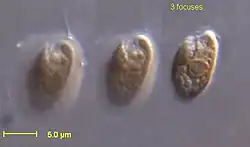Cryptista
| Cryptista | |
|---|---|

| |
| Rhodomonas salina, a cryptomonad | |
| Scientific classification | |
| Domain: | Eukaryota |
| Clade: | Pancryptista |
| Phylum: | Cavalier-Smith, 1989 emend. 2015 |
| Classes | |
Cryptista is a phylum of alga-like eukaryotes. It is most likely related to Archaeplastida which includes plants and many algae, within the larger group Diaphoretickes.[1]
Other characteristic features of cryptomonad mtDNAs include large syntenic clusters resembling α-proteobacterial operons that encode bacteria-like rRNAs, tRNAs, and ribosomal protein genes. Additionally, they are an evolutionarily significant lineage found in mostly marine, glacial and freshwater environments.
Although it has sometimes placed along with Haptista in the subkingdom Hacrobia, within the kingdom Chromista,[2] most recent studies have found that Hacrobia is not a clade.[3] For example, in 2016, a broad phylogenomic study found that cryptists fall within the group Archaeplastida, while haptophytes are closely related to the SAR supergroup.[4][5]
Morphology
The ornamental structures of the cell membrane vary among cryptists. They also have varying flagellar appendages.[6]
Taxonomy
Based on studies done by Cavalier-Smith et al.[7][8][9]
- Phylum Cryptista Cavalier-Smith, 1989 emend. 2015
- Subphylum Endohelia Cavalier-Smith, 2021
- Class Endohelea Cavalier-Smith in Yabuki et al., 2012 emend. Cavalier-Smith 2021
- Subphylum Palpitia Cavalier-Smith in Cavalier-Smith & Chao, 2012
- Class Palpitea Cavalier-Smith in Cavalier-Smith & Chao, 2012
- Subphylum Rollomonadia Cavalier-Smith, 2013
- Superclass Cryptomonada Cavalier-Smith, 2004 stat. n. 2015
- Class Cryptophyceae Fritsch in West & Fritsch, 1927
- Class Goniomonadea Cavalier-Smith, 1993
- Superclass Leucocrypta Cavalier-Smith, 2004 stat. n. 2015
- Class Leucocryptea Cavalier-Smith, 2004
- Superclass Cryptomonada Cavalier-Smith, 2004 stat. n. 2015
- Subphylum Endohelia Cavalier-Smith, 2021
Evolution
Last common ancestor of cryptists is thought to have naked cell membrane, mitochondrion with flat cristae, bipartite hairs and no ejectisomes. It employed phagocytosis, and maybe also photosynthesis.[6]
Phylogeny
The phylogeny is based on studies done by Cavalier-Smith, Yabuki, Yazaki and others. Endohelia is not included here because the new Endohelia includes one genus only, the Tetrahelia.[6][7][9][10]
| Cryptista | |
References
- ^ Adl SM, Bass D, Lane CE, Lukeš J, Schoch CL, Smirnov A, et al. (January 2019). "Revisions to the Classification, Nomenclature, and Diversity of Eukaryotes". The Journal of Eukaryotic Microbiology. 66 (1): 4–119. doi:10.1111/jeu.12691. PMC 6492006. PMID 30257078.
- ^ Ruggiero, Michael A.; Gordon, Dennis P.; Orrell, Thomas M.; Bailly, Nicolas; Bourgoin, Thierry; Brusca, Richard C.; Cavalier-Smith, Thomas; Guiry, Michael D.; Kirk, Paul M. (2015-04-29). "A Higher Level Classification of All Living Organisms". PLOS ONE. 10 (4): e0119248. Bibcode:2015PLoSO..1019248R. doi:10.1371/journal.pone.0119248. ISSN 1932-6203. PMC 4418965. PMID 25923521.
- ^ Burki F, Roger AJ, Brown MW, Simpson AG (January 2020). "The New Tree of Eukaryotes". Trends in Ecology & Evolution. 35 (1): 43–55. Bibcode:2020TEcoE..35...43B. doi:10.1016/j.tree.2019.08.008. PMID 31606140.
- ^ Burki F; Kaplan M; Tikhonenkov DV; Zlatogursky V; Minh BQ; Radaykina LV; Smirnov A; Mylnikov AP; Keeling PJ (2016), "Untangling the early diversification of eukaryotes: a phylogenomic study of the evolutionary origins of Centrohelida, Haptophyta and Cryptista.", Proc Biol Sci, 283 (1823): 20152802, doi:10.1098/rspb.2015.2802, PMC 4795036, PMID 26817772
- ^ Burki, F; Inagaki, Y; Bråte, J; Archibald, J.; Keeling, P.; Cavalier-Smith, T; Sakaguchi, M; Hashimoto, T; Horak, A; Kumar, S; Klaveness, D; Jakobsen, K.S; Pawlowski, J; Shalchian-Tabrizi, K (2009). "Large-scale phylogenomic analyses reveal that two enigmatic protist lineages, Telonemia and Centroheliozoa, are related to photosynthetic chromalveolates" (Free full text). Genome Biology and Evolution. 1: 231–8. doi:10.1093/gbe/evp022. PMC 2817417. PMID 20333193.
- ^ a b c Yabuki, Akinori; Kamikawa, Ryoma; Ishikawa, Sohta A.; Kolisko, Martin; Kim, Eunsoo; Tanabe, Akifumi S.; Kume, Keitaro; Ishida, Ken-ichiro; Inagki, Yuji (2014-04-10). "Palpitomonas bilix represents a basal cryptist lineage: insight into the character evolution in Cryptista". Scientific Reports. 4 (1): 4641. doi:10.1038/srep04641. ISSN 2045-2322. PMC 3982174. PMID 24717814.
- ^ a b Cavalier-Smith, Thomas; Chao, Ema E.; Lewis, Rhodri (2015-12-01). "Multiple origins of Heliozoa from flagellate ancestors: New cryptist subphylum Corbihelia, superclass Corbistoma, and monophyly of Haptista, Cryptista, Hacrobia and Chromista". Molecular Phylogenetics and Evolution. 93: 331–362. doi:10.1016/j.ympev.2015.07.004. ISSN 1055-7903.
- ^ Cavalier-Smith, Thomas (2018-01-01). "Kingdom Chromista and its eight phyla: a new synthesis emphasising periplastid protein targeting, cytoskeletal and periplastid evolution, and ancient divergences". Protoplasma. 255 (1): 297–357. doi:10.1007/s00709-017-1147-3. ISSN 1615-6102. PMC 5756292. PMID 28875267.
- ^ a b Cavalier-Smith, Thomas (2022-05-01). "Ciliary transition zone evolution and the root of the eukaryote tree: implications for opisthokont origin and classification of kingdoms Protozoa, Plantae, and Fungi". Protoplasma. 259 (3): 487–593. doi:10.1007/s00709-021-01665-7. ISSN 1615-6102. PMC 9010356. PMID 34940909.
- ^ Yazaki, Euki; Yabuki, Akinori; Imaizumi, Ayaka; Kume, Keitaro; Hashimoto, Tetsuo; Inagaki, Yuji (2022-04-13). "The closest lineage of Archaeplastida is revealed by phylogenomics analyses that include Microheliella maris". Open Biology. 12 (4): 210376. doi:10.1098/rsob.210376. PMC 9006020. PMID 35414259.
Takaramoto, S., Fainsod, S., Nagata, T., Rozenberg, A., Béjà, O., & Inoue, K., S (2024), "The roles of an extended N-terminal region and ETD motif in a pump-like cation channelrhodopsin discovered in a lake microbiome.", Journal of Molecular Biology, 436 (23), doi:10.1016/j.jmb.2024.168844, PMID 39476949{{citation}}: CS1 maint: multiple names: authors list (link)